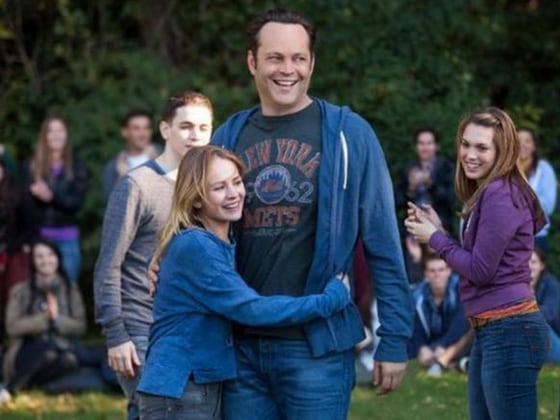Vince Vaughn's new sperm-donor comedy may be pure fiction, but it taps into a very real fertility conundrum.
In the movie, 'Delivery Man,' Vaughn's character discovers that, through a long-ago sperm donation and mixup at the clinic, he has fathered a whopping 533 children – a premise fertility experts stress could never happen.
"That number is crazy high, sensationalized and inaccurate," said Michelle Ottey, laboratory director for Fairfax Cryobank, which operates labs in six cities. In the U.S. most sperm banks restrict each contributor from creating no more than 25 families, and some even place the limit at 10.
But to make extra certain that no men somehow skirt around existing rules by making shady deposits at scattered clinics, Fairfax is about to team with other top sperm banks to launch a national database of sperm donors. The main idea, Ottey said, will be to better track who has contributed, where and when those men bestowed their living gifts, and block any guys from leaving their samples at multiple banks.
The new database is expected to be announced Dec. 1, Ottey said.
“One of the main objectives is to have a centralized location for all records," Ottey said. "Obviously we want to keep our numbers within our internal limits (of 25 families). And if a man chooses to donate at multiple banks, we lose control of that."
The repository is the product of rising collaboration between at least three of the largest sperm-banking systems, which in total operate more than a dozen labs from Boston to Austin to Palo Alto, Calf. In addition to Fairfax, Ottey mentioned the involvement of California Cryobank, based in Los Angeles. There, co-founder Dr. Charles Sims offers up a formal name.
“As an industry, it is important that we recognize the long-term needs of the families utilizing our services and continue working together to protect these records,” Sims said. “Bringing the National Gamete Donor Registry to life is a vital step in this process."
A 2011 story in The New York Times about a donor who fathered 150 children cited growing concerns about potential risks from sperm donors siring too many kids, including the possible spread of rare genetic diseases or unintentional incest.
While no single entity currently tracks national donation statistics, lab workers at Fairfax Cryobank say they've marked a sustained bump over recent years in the number of men wanting to donate.
That many new donors increases the need for careful oversight. At clinic websites, there's a complexity of choices for potential parents: ethnic origins, hair color and texture, height and weight, blood type, age, occupation and, at some, religions.
"Hopeful parents must sift through the medical records of sometimes hundreds of donors while the entire time remaining cautious and concerned about the accuracy of the information,” said Dr. Jeffrey Steinberg, medical director of the Fertility Institutes with offices in New York City, L.A., and Guadalajara, Mexico. “The concept of cross checks within a centralized databank of potential donors can only serve to reassure those seeking donors that an added level of safety and security has been put in place.”
The need for certain donors — specifically for men from a medley of backgrounds — has shifted. In the early-1990s, most clients were heterosexual couples with infertility issues. They usually wanted kids who resembled their eye and hair colors. Today, more than 70 percent of sperm recipients are lesbian couples or single women, Ottey said.
“It’s mostly educated men they’re looking for,” Ottey said, adding, “You can't just walk off the street and be a sperm donor.”
The screening and sample-testing process alone can last six weeks, an evaluation standard so rigorous that Fairfax accepts only about 1 percent of applicants. If accepted, Fairfax donors must agree to supply sperm once a week for six months.
In Texas, a 38-year-old engineer with an adventurous spirit has donated to Fairfax for five years. By clinic policy, the donor’s identity must remain anonymous.
Also policy: the progeny perimeters.
“Internationally, you can’t have more than 10 children. Domestically, you can’t have more than 25 families that you provide materials to,” said the engineer. “That would be a bit much for me. But if I have five or six children, (some) with maybe a couple of siblings, my priority is only that they are happy and healthy and want to pursue their passion, whether it be cooking or engineering or music, and that they’re raised in a loving family.”
It was his wife’s idea to donate. They married in their mid-to-late 30s and realized her biological clock might expire before they could have kids of their own. They have not been able to conceive, but the engineer’s wife suggested his intelligence and affection for high-adrenaline sports like skydiving and hang-gliding be passed to a new generation.
Under Fairfax rules, any children he fathers can choose, after age 18, to obtain his contact information. He doesn’t know if his samples have yielded any babies. He can ask. But only after he turns 40 — the age at which sperm banks decline donors due to the diminishing quality of their specimens — does he plan to inquire.
“I look forward to sitting down to have lunch with a son or a daughter (in 20 or so years),” he said, “and have them tell me about their aspirations, everything they’ve done, what they look forward to in life.”
That’s not a distant stretch from the plot “Delivery Man,” in which Vaughn's character learns that some of the hundreds of kids he sired through sperm donations are star athletes and world leaders.
And yet another sign that sperm donors and their offspring have become a more mainstream part of the new American family, MTV is launching a new docuseries, "Generation Cryo," about a Nevada teen's quest to meet her 15 half-siblings, fathered by the same anonymous sperm donor.
Bill Briggs is a contributing writer for NBC News. Reach him on Twitter.
